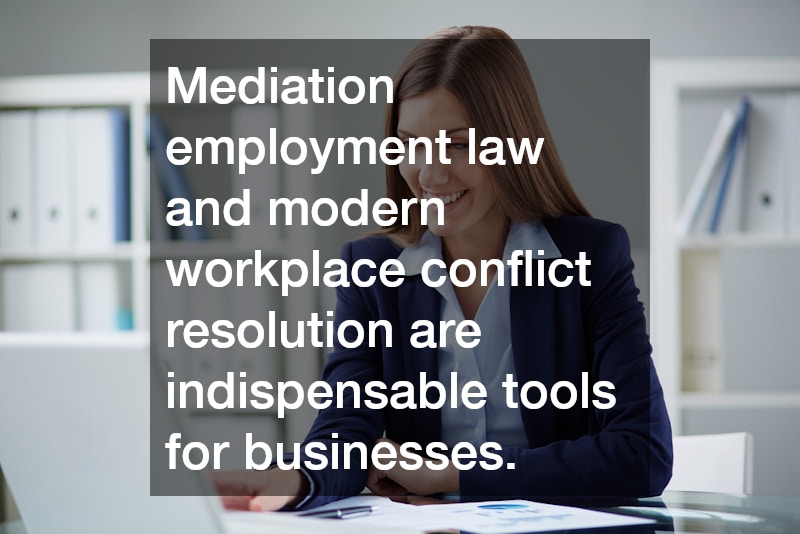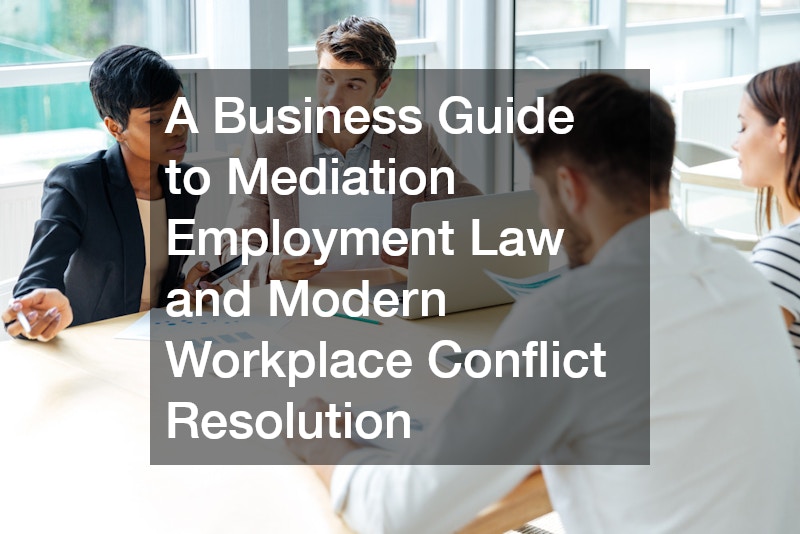In today’s dynamic business environment, managing workplace conflicts effectively is crucial for maintaining productivity and a harmonious work culture. The introduction of mediation employment law represents an invaluable tool for businesses seeking to navigate and resolve conflicts comprehensively. This article delves into the significance of mediation in employment law, illustrating how modern workplace conflict resolution practices can lead to more effective business operation and employee satisfaction.
Importance of Mediation in Employment Law
Mediation employment law has become increasingly significant as organizations strive to address workplace disputes more proactively. Unlike traditional litigation, mediation offers a more collaborative and less adversarial approach, allowing all parties involved to engage in dialogue and find mutually beneficial solutions. This not only reduces the cost and time associated with legal proceedings but also helps in maintaining and restoring relationships at the workplace. Employers are encouraged to implement mediation as a first-line approach to conflict resolution, highlighting their commitment to fair and equitable treatment. By prioritizing mediation, businesses can foster a more positive work environment and reduce turnover rates.
Furthermore, mediation employment law provides both employers and employees with a sense of empowerment, as it allows them to actively participate in resolving their conflicts. The structured yet flexible nature of mediation enables customized solutions that cater to the specific needs of both parties. In this process, professional mediators, often neutral third parties, guide the discussion, ensuring that all voices are heard and respected. The collaborative effort encourages transparency, enhances communication, and brings about innovative solutions that may not emerge from formal litigation. The result is a more engaged workforce that feels heard and valued.
Approaches to Workplace Conflict Resolution
Modern workplace conflict resolution strategies have evolved to place emphasis on collaboration and understanding, dovetailing seamlessly with mediation practices. Businesses today recognize that effective conflict resolution goes beyond addressing immediate issues and focuses on fostering a collaborative work culture. This cultural shift encourages participation from all levels of an organization and ensures that conflicts are seen as opportunities for growth and improvement rather than obstacles. Through training programs, workshops, and regular feedback loops, modern workplaces empower employees with conflict resolution skills aligned with current business values. By integrating these practices, companies not only enhance employee satisfaction but also achieve better retention and improved team dynamics.
A key aspect of modern conflict resolution is incorporating emotional intelligence into the workplace. Employees are encouraged to develop self-awareness and empathy, which are essential skills for understanding diverse perspectives and resolving conflicts amicably. By fostering an environment of emotional intelligence, businesses can reduce misunderstandings and promote stronger interpersonal relationships. Mediation employment law complements this approach, providing the framework within which personal competencies can be translated into constructive dialogue. The sense of empathy enables teams to tackle issues collaboratively and find resolutions that are fair, practical, and strengthening to team cohesion.
Catalyst for Positive Workplace Change
Mediation acts as a catalyst for fostering positive change within organizations by transforming conflict resolution into an opportunity for improvement. When businesses adopt mediation employment law frameworks, they create a culture of openness and transparency, encouraging employees to voice concerns without fear of repercussions. This approach not only mitigates internal disputes effectively but also propels teams toward innovative solutions and improved working relationships. The benefits of mediation go beyond conflict resolution, as it also acts as a platform for continuous development and learning. Organizations that embrace mediation practices often witness enhanced creativity, problem-solving capabilities, and overall workplace morale.
Adopting mediation frameworks signals to employees that their contribution to a harmonious workplace is valued, promoting a culture of respect and mutual understanding. This culture encourages employees to collaborate constructively, driving improvements in overall team performance and satisfaction. Moreover, businesses that prioritize mediation demonstrate a commitment to well-being, which is increasingly becoming a key factor in talent attraction and retention. By adopting mediation practices, companies distinguish themselves as employers of choice, thereby building a competitive advantage in the marketplace. The integration of mediation into workplace culture fundamentally shifts the way teams operate, promoting a more unified and efficient operational model.
Mediation employment law and modern workplace conflict resolution are indispensable tools for businesses aiming to thrive in today’s competitive and ever-changing landscape. By fostering a culture of collaboration and transparency, mediation helps organizations manage conflicts effectively, promoting a positive work environment and sustainable growth. As more businesses turn towards mediation and innovative conflict resolution strategies, they not only navigate disputes more effectively but also create workplaces that are resilient, inclusive, and forward-thinking. Ultimately, embracing these practices ensures that businesses remain agile and better equipped to meet the demands of the modern workforce, leading to long-term success and employee fulfillment.





